|
Delco-Remy in WWII
Delco-Remy WWII Aircraft Products
Delco-Remy WWII Marine
Equipment
Delco-Remy WWII Tank Products
Delco-Remy WWII Vehicle Products
Delco-Remy and LST-393
Delco-Remy WWII Antioch Foundry
Delco-Remy WWII
Stationary Engine Products
Delco-Remy WWII
Electrical Components for the Reo and Federal Truck, 20-Ton, 6x4
Delco-Remy
Training Manuals for Aircraft Components
Delco-Remy in World War Two
Navy-owned Ordnance Plant at Kings Mills, OH
This page updated 4-21-2025.
The April 28, 1944 Delco-Remy
Clan announced that the Navy had taken over the Army's Ordnance plant in
King's Mills, OH. Delco-Remy was contracted to build starting
motors for Navy diesel powered landing craft in the Navy owned plant.
Through the rest of 1944 and until June 1945, Delco-Remy built landing
craft starters and switches in the Navy's Kings Mills, OH plant.
Before Delco-Remy took over management of the plant, Remington
Arms produced ammunition in it until March of 1944. The .30
carbine ammunition being made in the plant could not be produced in the
quantities needed and was moved to a larger plant. Then the U.S.
Navy took control from the U.S. Army. Delco-Remy tooled up the plant in 60 days for the
production of naval cranking motors and switches for landing craft.
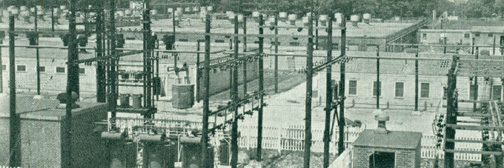
There are only two period photos of the
Kings Mills plant from DR literature. This photo was in
the 1944 Delco-Remy publication "Our War Job." Note the
large expanse of the complex, the exhaust fans, and the power
transformers.
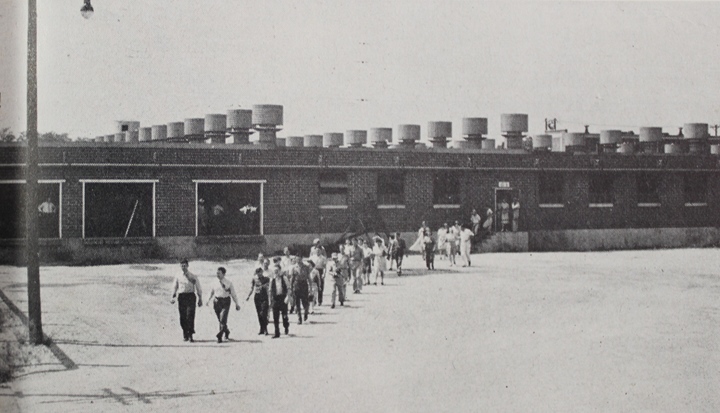
This photo, from the October 6, 1944 Delco-Remy Clan,
shows the workers going to lunch. Note all of the exhaust fans on
the roof.
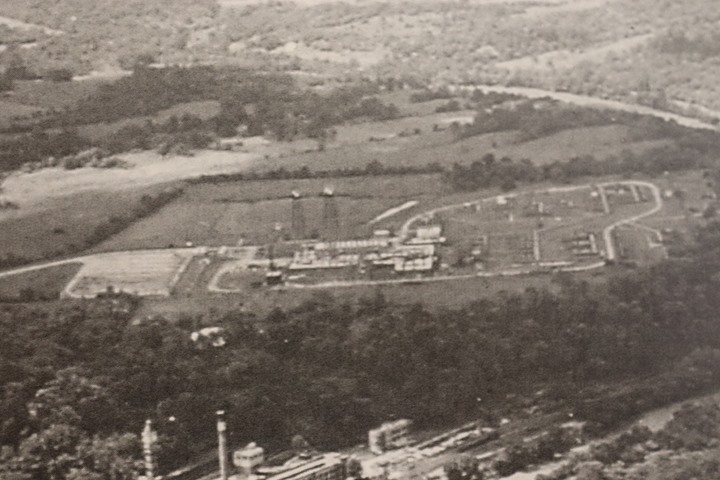
This is where Delco-Remy made landing craft starters and
switches for the U.S. Navy in 1944-45. This was the Delco-Remy Kings Mills plant. Photo added 8-31-2017.
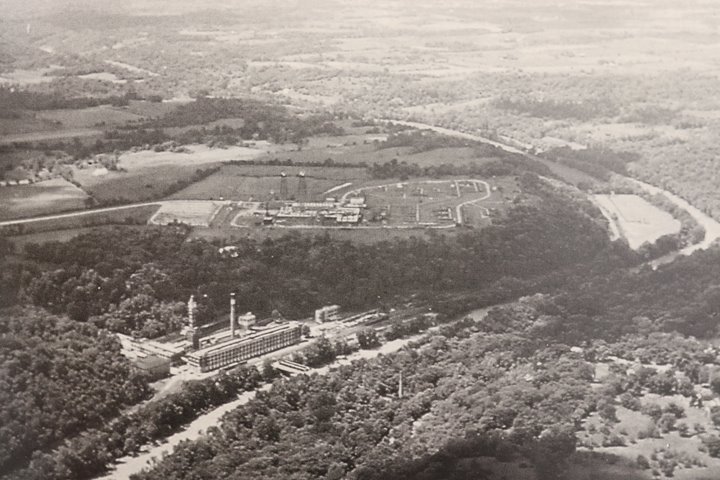
This 1942 photo shows the original Peters
Cartridge Company along the Little Miami River. On top of the hill
above it is the Kings Mills Ordnance Plant that Delco-Remy took over in
1944-45. The small town of Kings Mills, Ohio is across the river in the woods
from the plant. In the upper right hand corner of the photo is the
current location of the Kings Island amusement park. Photo
added 8-31-2017.
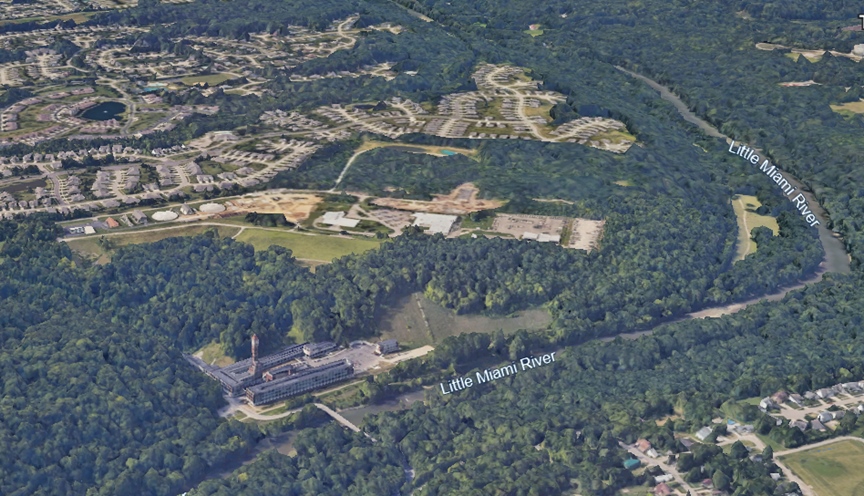
This Google Earth image shows the current
view as in the above 1942 photo. The original Peters Cartridge
Company is still along the Little Miami River. Multiple housing
additions are now located to the south of the former Delco-Remy plant.
Image added 4-21-2025.
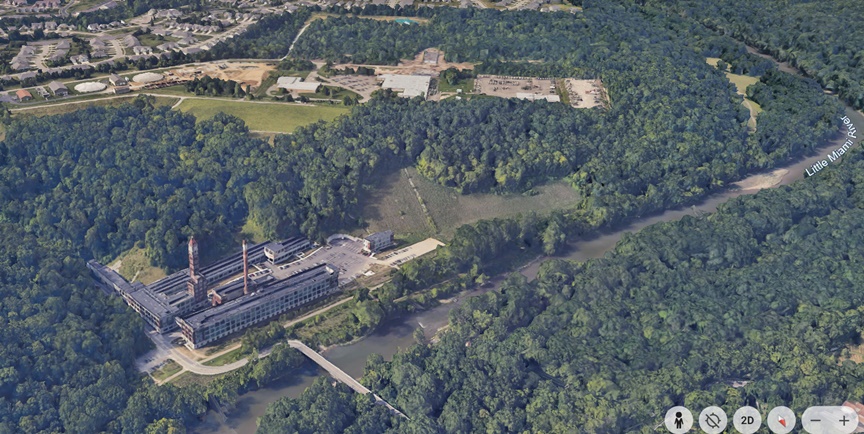
This image gives a closer look at the
facility. The former Peters Cartridge Company can be seen along
the river. Image courtesy of Google Earth added 4-21-2025.
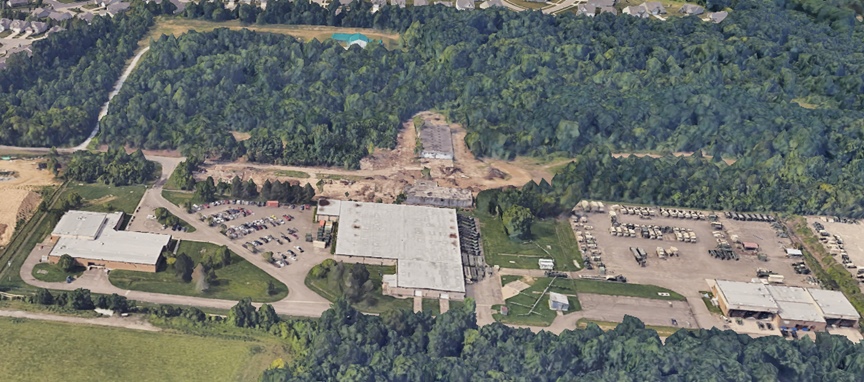
The former Kings Mills Ordnance Plant has
largely been replaced by an Army Reserve Center. Image courtesy of
Google Earth added 4-21-2025.
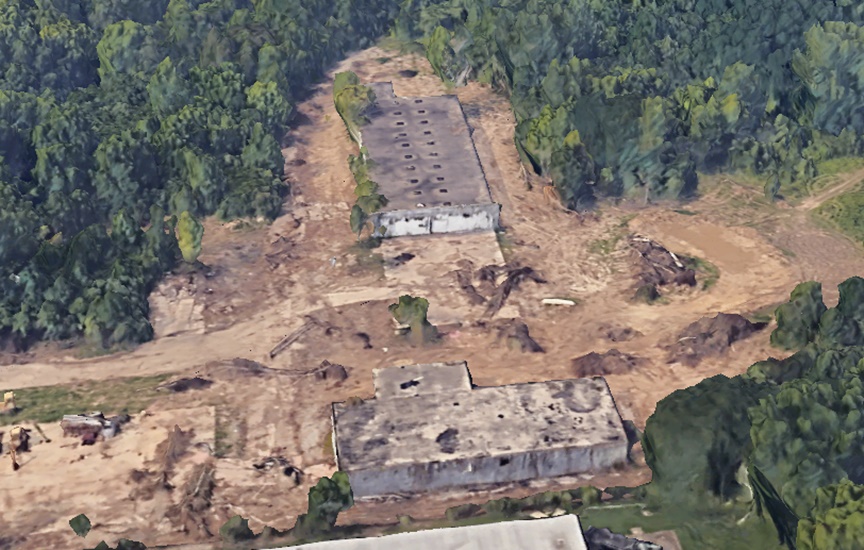
Google Earth still shows two of the
former buildings that housed the Delco-Remy plant still standing in
Kings Mills. Image courtesy of Google Earth added 4-21-2025.
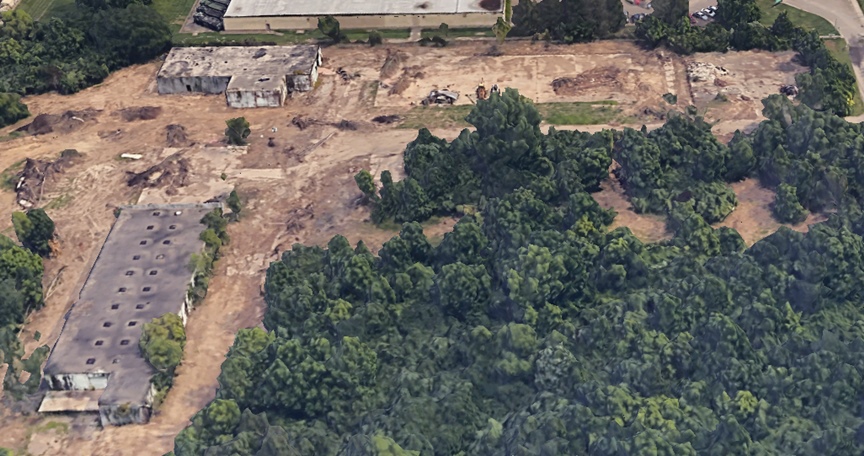
This and the next image are looking north.
Image courtesy of Google Earth added 4-21-2025.
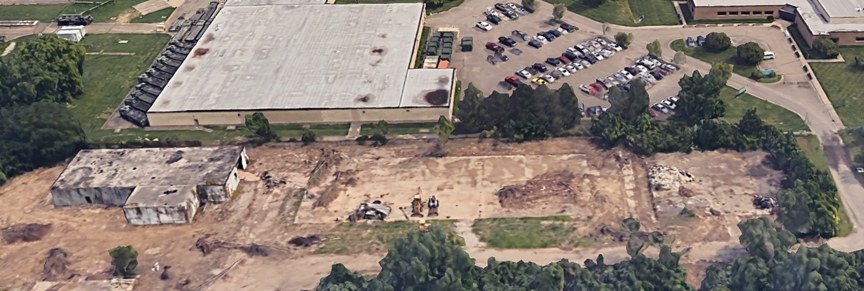
The floor of a now razed plant can be seen
to the east of the former building that is still standing.
Image courtesy of Google Earth added 4-21-2025.
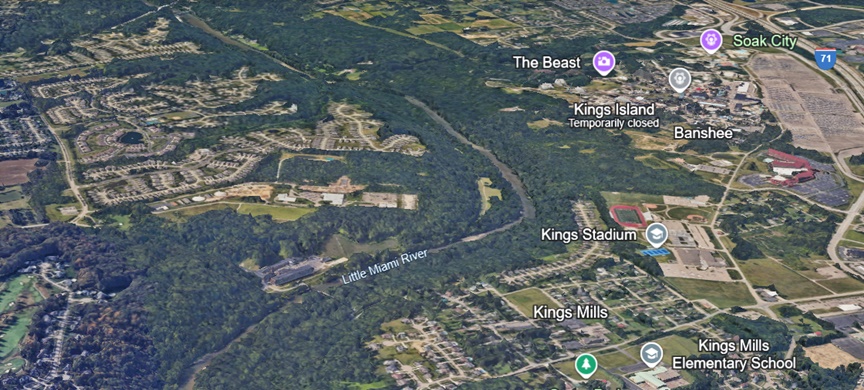
This Google Earth image shows the larger
area surrounding the plant today. Civilization has invaded the
formerly little populated farmland. Image courtesy of Google Earth added
4-21-2025.
Table 1 - Delco-Remy Division's Major World War Two Contracts
- Kings Mill, OH Landing Craft Starter Motor Plant
Added 4-21-2025.
The information below
comes from the "Alphabetical Listing of Major War Supply
Contracts, June 1940 through September 1945." This was
published by the Civilian Production Administration, Industrial
Statistics Division. |
|
Product - Customer |
Contract Number |
Contract Amount |
Contract Awarded
|
Completion
Date |
| Diesel Engine
Motors - Navy Ships Bureau |
OBS-14704 |
$2,076,000 |
5-1944 |
6-1945 |
|
Total |
|
$2,076,000 |
|
|
The Kings Mill plant had one major contract
from the U.S. Navy for diesel engine motors as shown in Table 1 above.
The diesel engine for which the cranking motors were being built was the
Gray Marine 64HN9/Detroit Diesel 6-71 Marine
Engine. This engine was the marine version of the Detroit Diesel
Division of General Motors 6-71 six-cylinder 225 h.p. engine.
Detroit Diesel built up the engine, tested it, and then shipped it to
Gray Marine in Detroit. Gray then
added all of the necessary equipment for marine operation in landing
craft. This included but was not limited to adding a heat exchanger and
transmission. Because Gray was the last company to work on the
engine, it is normally known as the Gray Marine 64HN9. However,
because Detroit Diesel supplied the base engine, I make note of its
important contribution by denoting it as the Gray Marine 84HN9/Detroit
Diesel 6-71. Like the Packard 4M2500 marine engine, it was in high
demand with a limited supply and was the preferred engine for American
landing craft during World War Two.
The table below summarizes the number of World
War Two landing craft built with Detroit Diesel Division of GM engines.
The 43,060 diesel powered landing craft were equipped with a total of
57,189 6-71 engines, each using a Remy starter, generator, voltage
regulator, and supercharger blower. Delco-Remy also cast pistons
for Detroit Diesel, and they were used in the landing craft engines.
Delco-Remy supplied starters for all of the
57,189 6-71 engines that were built, according to Table 2 below.
The Kings Mills plant would have built a portion of the 57,189 motors
needed in the last year of the war.
|
Table 2 - Detroit Diesel
Engine World War Two Landing Craft Applications |
|
Type Landing Craft |
Number built |
Type Engine |
Engines per Landing Craft |
Landing Craft using Detroit Diesel Engines for propulsion |
Number of Detroit Diesel Engines for propulsion |
Number of 6-71 for ship's power |
6-71 Engines Usage |
Comments |
| LCP(L) |
2,193 |
Various including
Gray Marine 64HN9/Detroit Diesel 6-71 |
1 |
1,097 |
1,097 |
|
1,097 |
Assumes 50% Gray
Marine 64HN9/Detroit Diesel 6-71 as that was the preferred
engine. |
| LCP(R) |
2,572 |
Various including
Gray Marine 64HN9/Detroit Diesel 6-71 |
1 |
1,286 |
1,286 |
|
1,286
|
Assumes 50% Gray
Marine 64HN9/Detroit Diesel 6-71 as that was the preferred
engine. |
| LCV |
2,366 |
Various including
Gray Marine 64HN9/Detroit Diesel 6-71 |
1 |
1,183 |
1,183 |
|
1,183
|
Assumes 50% Gray
Marine 64HN9/Detroit Diesel 6-71 as that was the preferred
engine. |
| LCVP |
23,353 |
Gray Marine
64HN9/Detroit Diesel 6-71 or Hudson built Hall-Scott 210 hp
gasoline powered Invader |
1 |
19,353 |
19,353 |
|
19,353 |
Some LCVPs
received the Hudson-built Hall-Scott 210 hp gasoline powered
Invader engines due to the fact Detroit Diesel could not supply
all of the engines the military was requesting. Hudson built
4,000 of these so I have used that number to subtract from
23,353. |
| LCM(3) |
8,631 |
Gray Marine
64HN9/Detroit Diesel 6-71 or
Kermanth 100 hp six cylinder gasoline engines |
2 |
4,223 |
8,446 |
|
8,446 |
Assumes 50% Gray
Marine 64HN9/Detroit Diesel 6-71 as that was the preferred
engine. |
| LCM(4) |
2,718 |
Gray Marine
64HN9/Detroit Diesel 6-71 or
Kermanth 100 hp six cylinder gasoline engines |
2 |
2,039 |
4,078 |
|
4,078 |
Assumes 75% Gray
Marine 64HN9/Detroit Diesel 6-71 as that was the preferred
engine. |
| LCM(6) |
2513 |
Gray Marine
64HN9/Detroit Diesel 6-71 or
Kermanth 100 hp six cylinder gasoline engines |
2 |
1,885 |
3,770 |
|
3,770 |
Assumes 75% Gray
Marine 64HN9/Detroit Diesel 6-71 as that was the preferred
engine. |
| LCT(5) |
470 |
Gray Marine 64HN9/Detroit Diesel 6-71 |
3 |
470 |
1,410 |
|
1,410 |
|
| LCT(6)
|
960 |
Gray Marine 64HN9/Detroit Diesel
6-71 |
3 |
960 |
2,880 |
|
2,880 |
|
| LCI |
923 |
Detroit Quad
Diesels (6051) |
2 |
923 |
1,846 |
1,846 |
9,230 |
The 6051 was the
designation for four 6-71s tied together. The ship's power on
the LCI was provided by two 6-71 engines driving 60KW
generators. |
| LCS(L) |
130 |
Detroit Quad
Diesels (6051) |
2 |
130 |
260 |
260 |
1,300 |
The ship's power
on the LCS(L) was provided by two 6-71 engines driving 60KW
generators. There is still one LCS(L) in existence at Mare
Island in San Francisco, CA. See the links page for more
information. |
| LST |
1,052 |
Detroit Diesel
6-71 |
3 |
1,052 |
0 |
3,156 |
3,156 |
The ship/s power
on the LST was provided by three 6-71 engines driving 100KW
generators. |
| Totals |
47,881 |
|
|
34,601 |
45,609 |
5,316 |
57,189 |
This does not
include any spares. Also, this is almost a year's
production for Detroit Diesel during the World War Two. |
|
Type Landing Craft |
Number built |
Type Engine |
Engines per Landing Craft |
Landing Craft using Detroit Diesel Engines |
Number of Detroit Diesel Engines |
Number of 6-71 for ship's power |
6-71 Engines Usage |
Comments |
Delco-Remy also supplied the starter,
generator, voltage regulator, and supercharger blower for the 4,000
gasoline engines built by Hudson for 36-foot wooden landing craft during
World War Two.
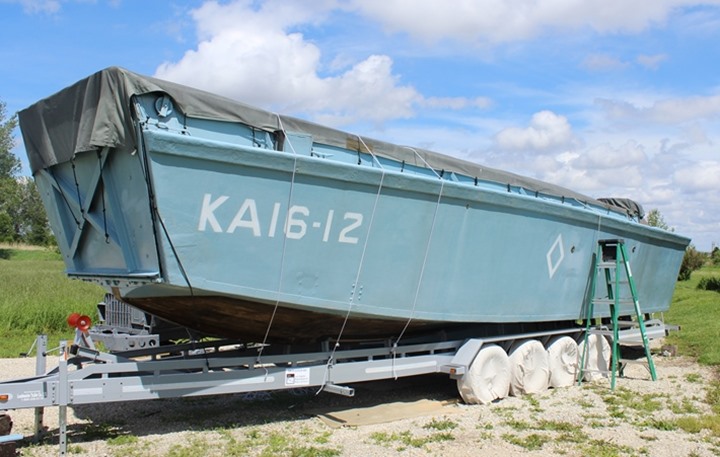
The LCVP landing craft was the largest user
of Gray Marine 64HN9/Detroit Diesel 6-71 Marine Engine. Author's
photo added 4-21-2025.
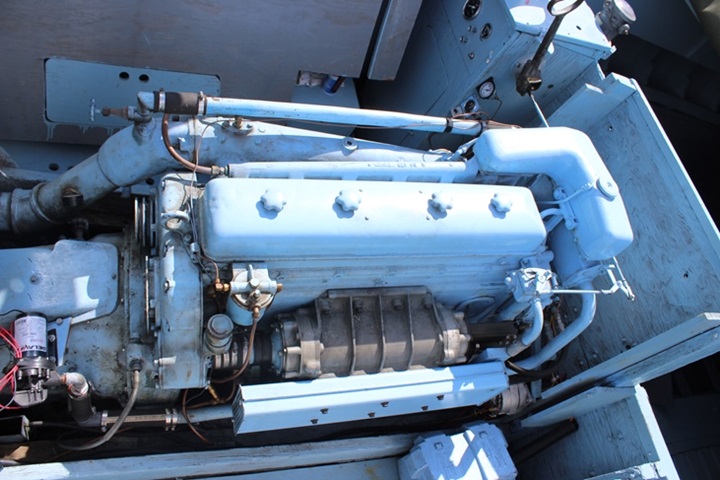
This photo shows the Gray Marine 64HN9/Detroit Diesel 6-71 Marine
Engine. Author's photo added 4-21-2025.
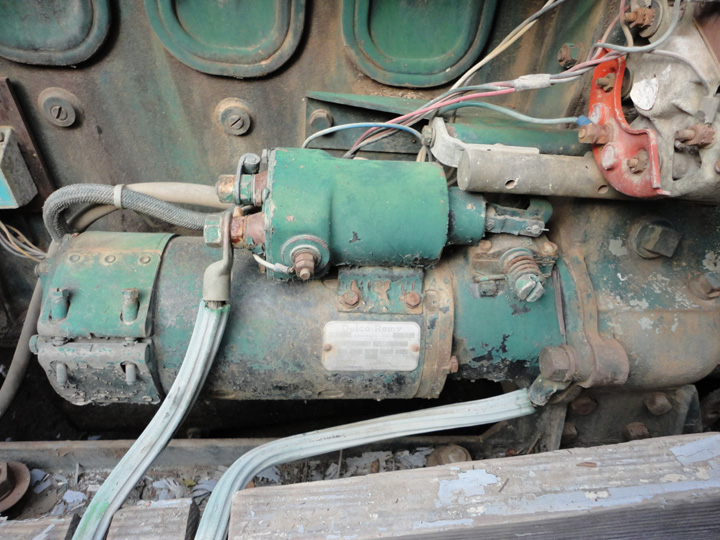
The Delco-Remy Kings Mills plant produced
cranking motors and the attached switch for LCVPs and other landing
craft during the last months of World War Two. Photo courtesy of
Chuck C. Roberts of the Roberts Armory added 4-21-2025.
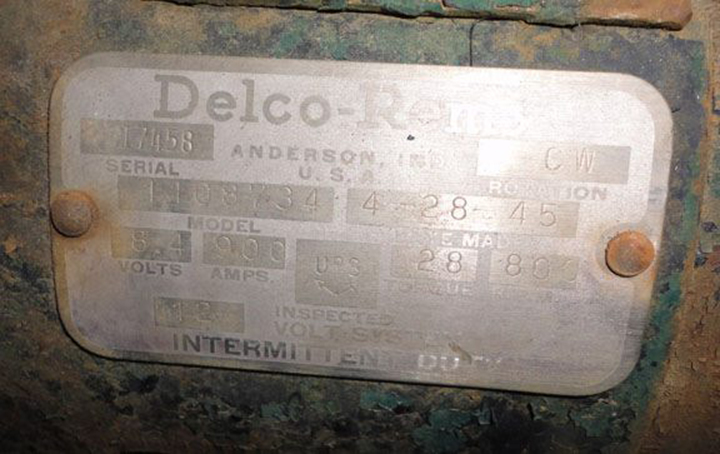
This is a Delco-Remy Model 1108734 built on
4-28-1945. Most likely this was built at Kings Mill but showed the
Anderson, IN address. Photo courtesy of Chuck C. Roberts of the
Roberts Armory added 4-21-2025.
The Peters Cartridge Company Plant:
The photos below are of the original Peters Cartridge Company plant
along the Little Miami River.
Built in the 1860's, the plant produced cannon balls and bullets for the
Union Army. Morgan's Raiders attempted to attack the complex when they
invaded Ohio in 1863, but apparently became lost and missed the plant.
This is a most interesting old factory complex, and I am including photos
of it on the page
for historical interest.
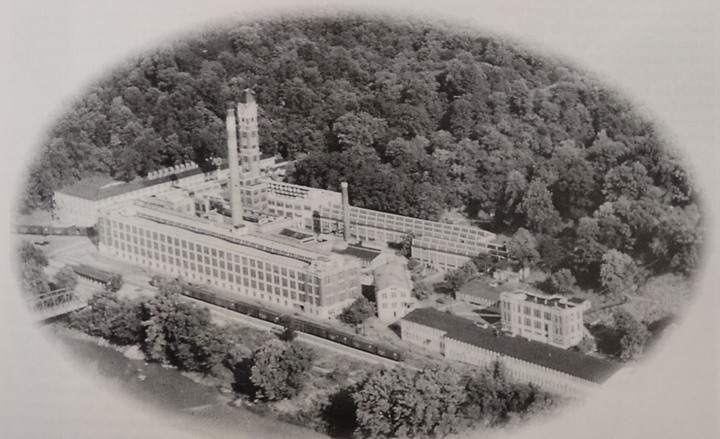
This 1935 aerial photo of the Peters
Cartridge Company along the Little Miami River at Kings Mills, OH.
This is looking southeast. Compare this to the photos below taken
in 2016. Some of the buildings are gone, but several still remain.
The railroad track between the plant and the river is now a
walking trial. There is a one lane bridge across the river that
does not exist today. It has been replaced by a more modern
structure. Author's photo added 8-31-2017.
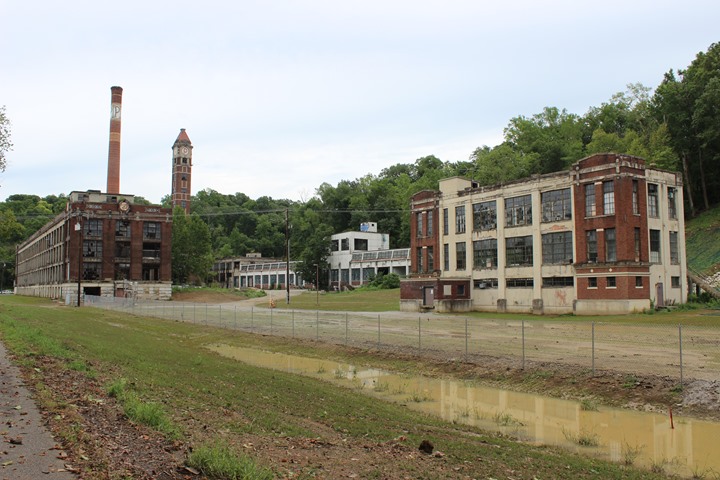
This is the view of what remains today of the Peters Cartridge Company,
on the south side of the Little Miami River. Google Earth shows
the grass area all in trees. In the spring of 2015 all of
the trees were cut down as part of an EPA superfund hazardous
material clean-up of 80 years of ammunition
manufacturing waste. Author's photo.
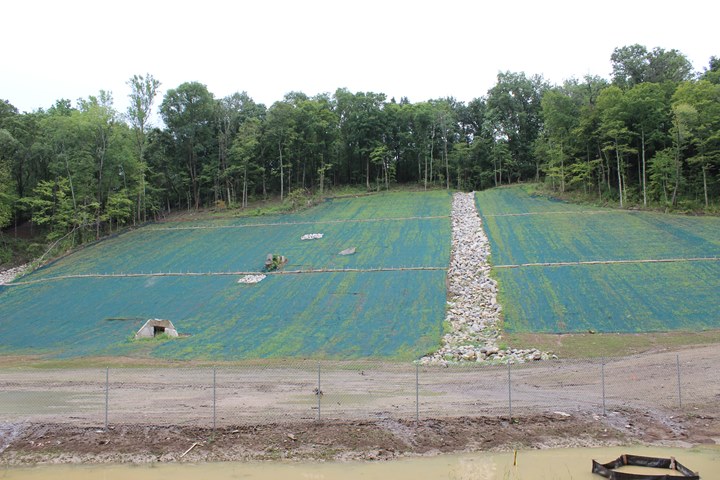
These trees were all cut down and the slope reseeded. The
Delco-Remy Navy landing craft cranking motor plant was located
over the top of the hill.
Author's photo.
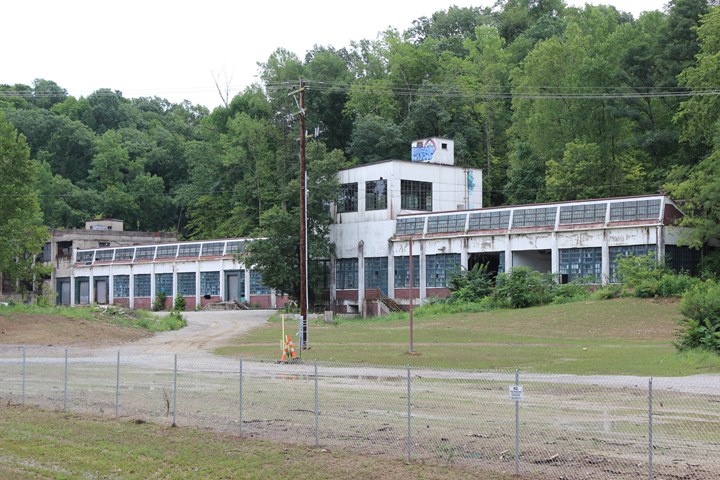
Author's photo.
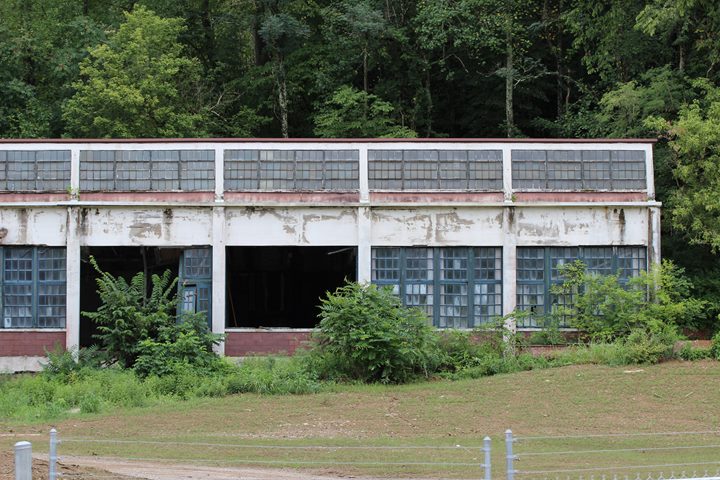
Author's photo.
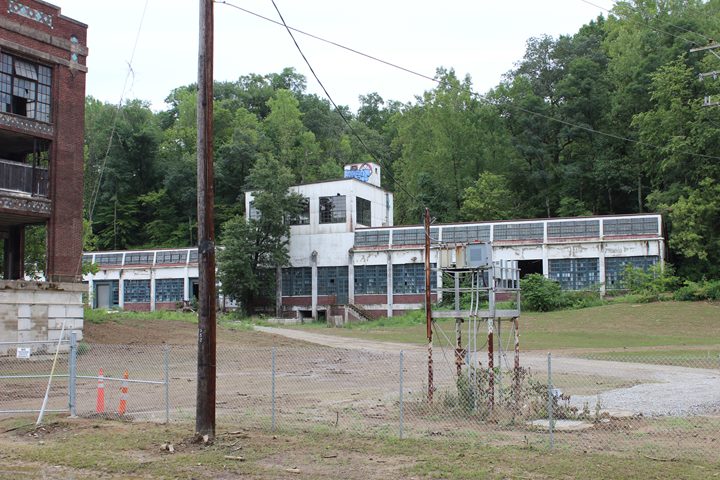
Author's photo.
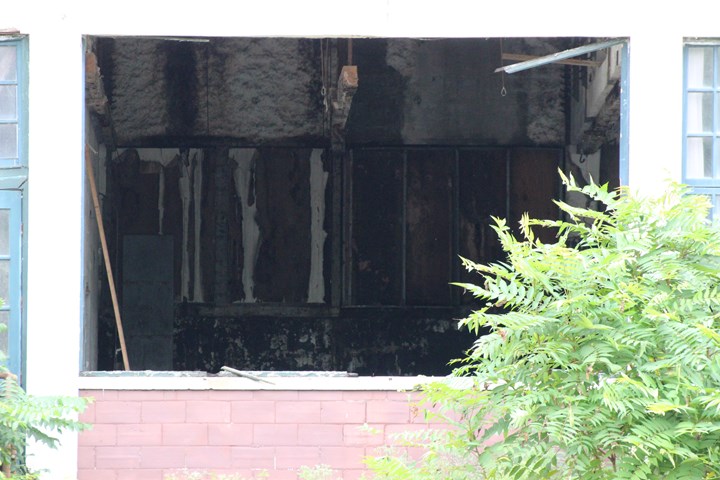
Author's photo.
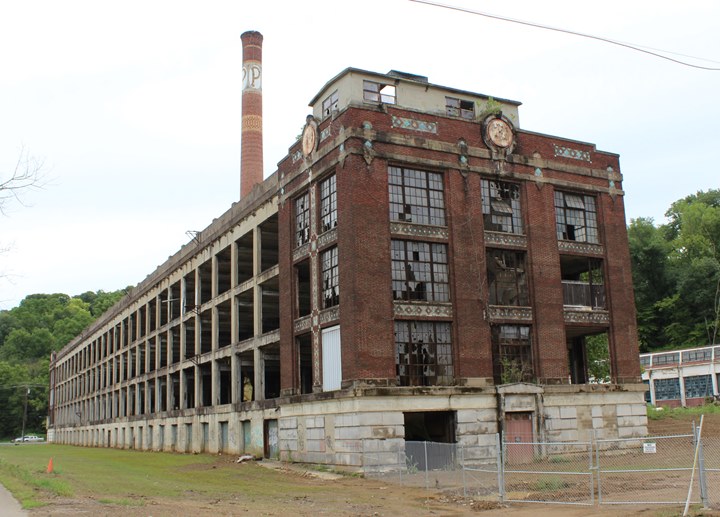
This appears to be the original building.
Local developers have converted this building to lofts since I took
these photos in 2016. Author's photo.
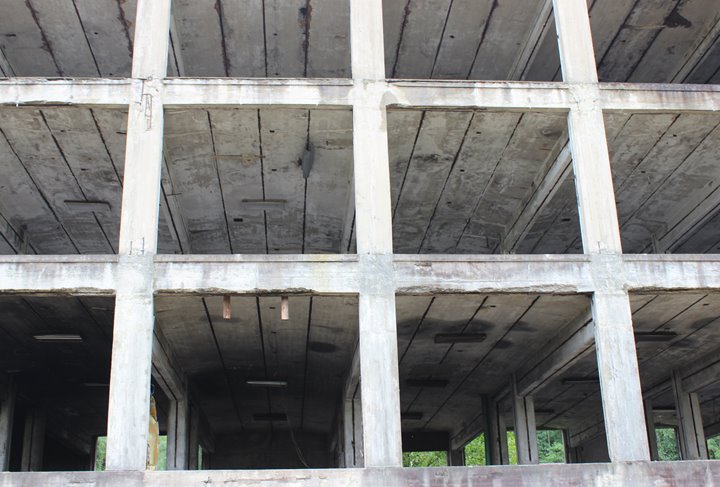
Author's photo.
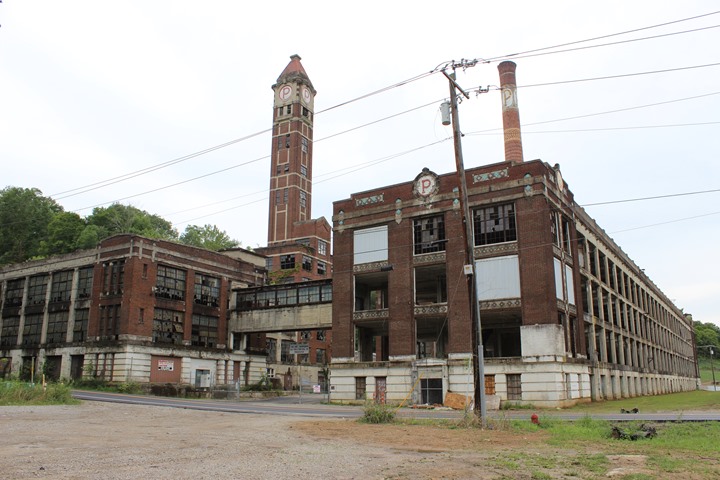
The clock tower in the center is the
original shot tower. Hot lead was dropped from the top of the
tower. By the time it hit bottom it would have frozen into a perfect sphere.
Author's photo.
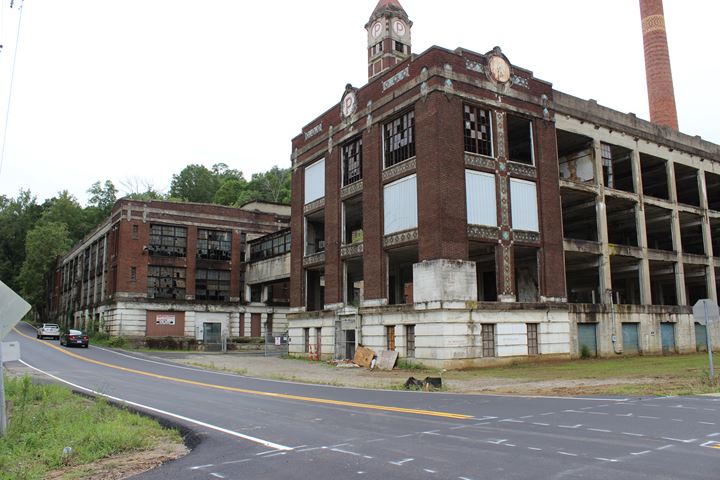
Up the road and to the right is the location
of the former Delco-Remy Navy landing craft cranking motor plant. Author's photo.
|

























